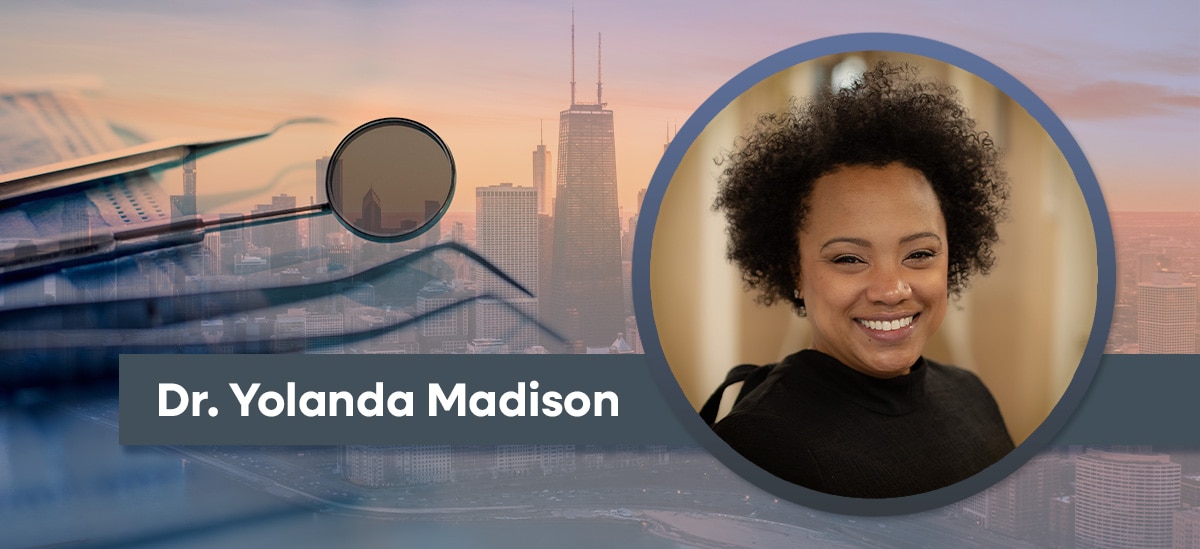
Yolanda Madison liked going to the dentist when she was young. “I thought the dentist’s office was a really cool place,” she said. “It’s not as if I had perfect teeth as a kid. I got shots and had cavities filled, but I was very interested in what went on there.”
Dr. Madison did her best to share that positive perspective with her patients when she worked for a year as a general dentist in Philadelphia, and she has continued to do so in the years since, as an endodontist with A-Dentacare Specialists in Chicago — the practice she built on her steady referral pipeline and now owns.
“It’s important for everyone to feel welcome and respected when they come to our office. I talk with them and address any anxiety or concerns they may have,” she explained. “I like when patients are surprised about the procedure: about it not hurting and not taking very long. Sometimes they get so comfortable they actually fall asleep during the procedure.”
Dr. Madison shared insights into acquiring and operating A-Dentacare Specialists:
When you joined A-Dentacare Specialists, did you plan to one day acquire the practice?
It was always a dream to own my own practice. The A-Dentacare opportunity aligned with that dream because the original owner, Dr. John Dimoulis, was considering retirement. After I bought the practice from him in 2019, he continued to work with us for several years, so the transition of ownership was seamless.
Did anything surprise you about being a practice owner?
Yes. Over the years, I’ve heard people complain about the pressures of being a business owner or, specifically, a dental practice owner, but I have no complaints! Entrepreneurship fits my personality. As an endodontist, I work in half-millimeter increments, so attention to detail is one of my strengths. That’s valuable on the business side as well as the practice side.
I also feel that running my own practice gives me a lot of freedom. I’ve been set up to live the life I want to lead. Some practice owners say they don’t have time to take vacation, but you just have to structure your practice so you can. My PNC banker did a very good job when he was helping me negotiate the acquisition; he took things like my having a life outside of work into consideration. Some people feel stuck because they’re just focused on the numbers, but when I need a break, I take one!
How did you come to choose PNC as your bank?
I had a PNC personal bank account when I was in dental school at the University of Pennsylvania in Philadelphia. I closed it when I moved to pursue my endodontics specialty at the University of Illinois Chicago College of Dentistry, because I didn’t realize that PNC was also in Chicago. But when my accountant recommended PNC for my business banking, I was happy to reestablish ties, and I have gotten good advice from PNC ever since. In addition to helping with the practice transition, my business banker has made managing the financial side of the practice much easier than I had anticipated it would be.
What other external advisors do you rely on?
Dr. Dimoulis continues to offer helpful advice, as do many of my friends who bought practices or started their own. They’re established in different areas, so their experiences may not apply 100% to where I am, but I appreciate when they share insights, lessons learned and best practices. Obviously, I listen to my accountant as well.
What’s your vision for the future of your practice?
I would like to grow the practice. We have space to add another doctor, and I’d really like to do that. I’d also like to continue building on our community involvement, identifying new ways to support our neighbors.
What do you find most gratifying about being an entrepreneur?
I like being able to make my own decisions about our practice — especially in how we engage with the community. I live in the same neighborhood as the practice, so I walk to work and feel connected with the people who work and live nearby. For example, a community service organization recently opened a new location just down the street from us, and I’d like to get involved with that. We also participated in a Halloween trunk-or-treat event this year, even though we don’t treat many children in our practice. It was just fun to be out there, getting to know the families.
You’ve also been involved with the Chicago Coalition to End Homelessness, correct? Why is giving back to the community important to you?
Yes, I was on the associate board. I believe strongly that giving back is the only way communities can change on a large scale. Not everyone has everything they need all the time, so if you can give a little here and there, that makes the load lighter and the work easier.
What advice would you offer aspiring entrepreneurs?
If you really love to do something and it’s your dream to build a practice or a business around that, don’t give up. Before you start, make sure you love to do it; don’t go into it for money. With a small business, you need to love what you’re doing. Personally, I love what I do! It’s fun and interesting, and I like helping people. If there’s something you love to do and you don’t give up, all the pieces eventually fall into place.




